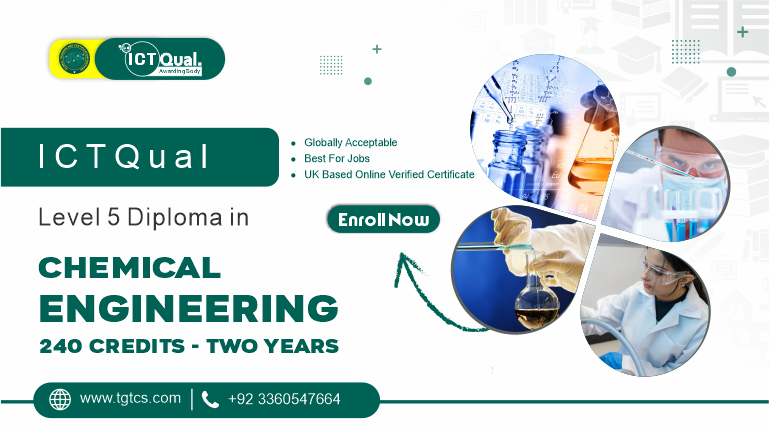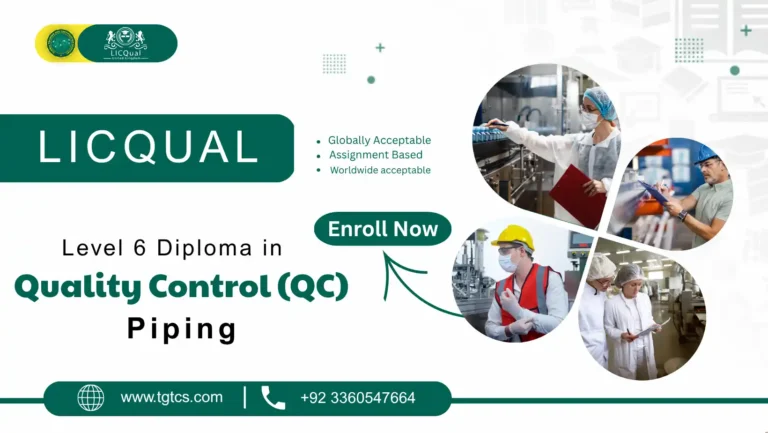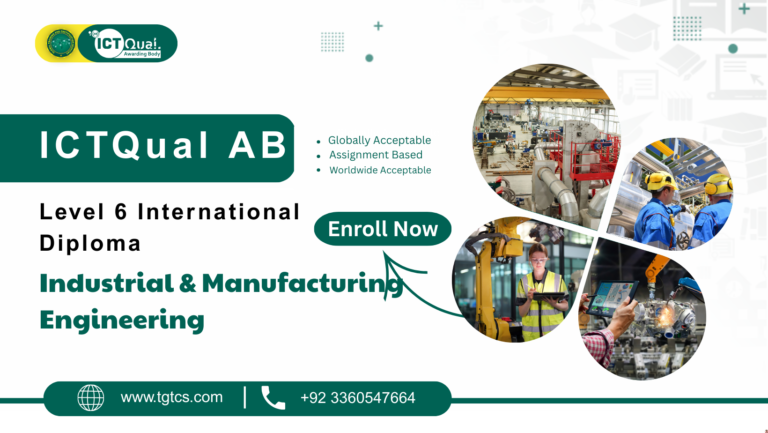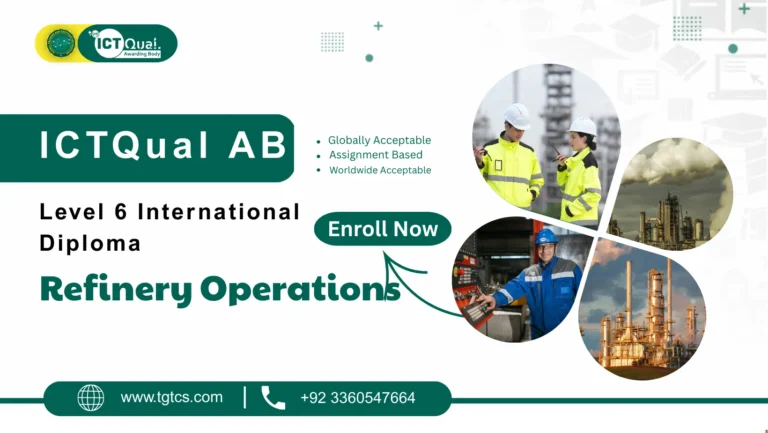ICTQual Level 5 Diploma in Chemical Engineering 240 Credits – Two Years
The ICTQual Level 5 Diploma in Chemical Engineering (240 Credits – Two Years) is your gateway to an exciting and rewarding career in one of the most dynamic fields today.
This comprehensive two-year course is designed to provide you with the technical knowledge, practical skills, and industry insights necessary to thrive in the ever-evolving world of chemical engineering. Whether you’re starting your career or looking to enhance your expertise, this qualification offers a solid foundation in key areas of chemical engineering.
The ICTQual Level 5 Diploma in Chemical Engineering is an advanced qualification that provides students with the skills and knowledge needed to pursue careers in the chemical and process industries. With a focus on both theoretical learning and practical applications, this course covers everything from the fundamentals of chemical engineering to specialized subjects like process control, energy systems, and chemical reaction engineering.
The ICTQual Level 5 Diploma in Chemical Engineering is the ideal qualification for individuals looking to enter the fast-paced world of chemical and process engineering. With a comprehensive curriculum, hands-on experience, and pathways for career advancement, this diploma prepares you for a successful career in a diverse and expanding field. Whether you’re passionate about sustainability, energy, or industrial processes, this course will give you the skills and knowledge needed to thrive in one of the most essential industries in the world.
The Global Training and Certification Services (TGTCS) is Directly Approved Training Centre of ICTQual
The ICTQual Level 5 Diploma in Chemical Engineering (240 Credits – Two Years) is an advanced qualification designed to provide students with comprehensive knowledge and practical skills in chemical engineering. Over the course of two years, students will cover key topics such as chemical process design, chemical reaction engineering, thermodynamics, fluid mechanics, sustainable engineering practices, and energy systems. This diploma equips graduates with the expertise needed to pursue careers in diverse industries, including chemical manufacturing, pharmaceuticals, energy, and environmental sustainability.
The course combines theoretical learning with hands-on experience, ensuring students can apply engineering principles to real-world challenges. Graduates will be well-prepared for roles such as chemical engineers, process engineers, production managers, and environmental compliance officers, with the qualification offering opportunities for further education and global career prospects. With a focus on sustainability and advanced engineering practices, the ICTQual Level 5 Diploma in Chemical Engineering serves as a strong foundation for future success in the chemical engineering field.
Mandatory Units
The Units of Level 5 Diploma in Chemical Engineering 240 Credits-Two Years are as :
Year 1 (120 Credits)
Semester 1
- Introduction to Chemical Engineering Principles
- Engineering Mathematics and Statistics
- Material and Energy Balances
- Thermodynamics
- Chemistry for Engineers
- Fluid Mechanics
Semester 2
- Heat Transfer Processes
- Chemical Process Industries
- Mechanical Properties of Materials
- Laboratory Skills and Safety
- Environmental Science and Sustainability
- Technical Communication and Report Writing
Year 2 (120 Credits)
Semester 1
- Advanced Thermodynamics
- Advance Fluid Mechanics
- Process Control and Instrumentation
- Chemical Reaction Engineering
- Separation Processes
- Industrial Health and Safety Management
Semester 2
- Chemical Process Design and Simulation
- Advanced Separation Processes
- Energy Systems and Renewable Technologies
- Advance Chemical Reaction Engineering
- Industrial Project Management
- Research Project in Chemical Engineering
Here are the Learning Outcomes for each study unit in the ICTQual Level 5 Diploma in Chemical Engineering (240 Credits – Two Years):
Year 1 (120 Credits)
Semester 1
Introduction to Chemical Engineering Principles
- Understand the role of chemical engineering in industrial processes.
- Analyze fundamental principles, including mass transfer, fluid flow, and heat exchange.
- Apply basic engineering concepts to solve chemical process problems.
Engineering Mathematics and Statistics
- Utilize advanced mathematical techniques to solve engineering problems.
- Interpret statistical data relevant to chemical processes.
- Develop mathematical models for process simulations.
Material and Energy Balances
- Perform mass and energy balance calculations for chemical systems.
- Assess process efficiency and resource utilization.
- Apply conservation principles to practical chemical engineering scenarios.
Thermodynamics
- Explain thermodynamic principles related to energy and material transformations.
- Solve problems using the first and second laws of thermodynamics.
- Analyze phase equilibrium and thermodynamic properties of substances.
Chemistry for Engineers
- Understand the chemical principles underpinning engineering processes.
- Analyze chemical reactions, stoichiometry, and kinetics.
- Evaluate the behavior of materials in various chemical environments.
Fluid Mechanics
- Explain fluid properties and their impact on process systems.
- Design and analyze fluid flow systems using Bernoulli’s equation and other principles.
- Solve engineering problems involving pumps, turbines, and pipe networks.
Semester 2
Heat Transfer Processes
- Understand conduction, convection, and radiation heat transfer mechanisms.
- Design and analyze heat exchangers for industrial applications.
- Evaluate thermal efficiency and optimize heat transfer systems.
Chemical Process Industries
- Analyze key chemical industries, including petrochemical, pharmaceutical, and food processing.
- Evaluate industrial processes from raw materials to final products.
- Understand economic and environmental factors in chemical production.
Mechanical Properties of Materials
- Understand material behavior under stress, strain, and temperature variations.
- Evaluate materials for use in chemical engineering applications.
- Analyze failure modes and select appropriate materials for specific processes.
Laboratory Skills and Safety
- Develop practical laboratory skills for chemical analysis and experiments.
- Follow safety protocols and risk assessments in laboratory environments.
- Accurately record, analyze, and interpret experimental data.
Environmental Science and Sustainability
- Understand the environmental impacts of chemical engineering processes.
- Develop sustainable engineering solutions for waste management and energy efficiency.
- Analyze regulatory requirements for environmental protection.
Technical Communication and Report Writing
- Develop technical writing skills for clear and concise communication.
- Prepare comprehensive engineering reports and documentation.
- Present technical findings effectively to various audiences.
Year 2 (120 Credits)
Semester 1
Advanced Thermodynamics
- Analyze advanced thermodynamic cycles and systems.
- Solve complex problems involving multi-phase and non-ideal systems.
- Apply thermodynamic principles to optimize industrial processes.
Advanced Fluid Mechanics
- Understand advanced concepts in fluid dynamics, including turbulence and compressible flow.
- Design and optimize fluid transport systems.
- Use computational tools to model fluid behavior in engineering systems.
Process Control and Instrumentation
- Understand process control principles, including feedback and feedforward systems.
- Design control strategies for industrial chemical processes.
- Use modern instrumentation and sensors for process monitoring.
Chemical Reaction Engineering
- Analyze reaction kinetics and reactor design.
- Optimize chemical reactors for efficiency and safety.
- Apply modeling techniques to scale up chemical reactions from laboratory to industry.
Separation Processes
- Understand principles of separation techniques such as distillation, filtration, and chromatography.
- Design and evaluate industrial separation systems.
- Optimize separation processes for cost and energy efficiency.
Industrial Health and Safety Management
- Analyze risks associated with chemical engineering processes.
- Develop safety management plans and emergency protocols.
- Ensure compliance with health and safety regulations in industrial environments.
Semester 2
Chemical Process Design and Simulation
- Use simulation tools to design and analyze chemical processes.
- Develop process flow diagrams and identify optimization opportunities.
- Evaluate the economic feasibility of chemical process designs.
Advanced Separation Processes
- Understand complex separation techniques, including membrane processes and crystallization.
- Design advanced systems for high-purity product requirements.
- Evaluate environmental impacts of separation technologies.
Energy Systems and Renewable Technologies
- Analyze energy systems and their applications in chemical engineering.
- Develop solutions using renewable energy technologies in process industries.
- Evaluate energy efficiency and sustainability in industrial processes.
Advanced Chemical Reaction Engineering
- Explore complex reaction mechanisms and multi-reaction systems.
- Optimize catalytic and non-catalytic reactions in industrial reactors.
- Apply computational tools to model reaction engineering systems.
Industrial Project Management
- Plan, execute, and monitor industrial engineering projects.
- Apply project management tools and techniques to chemical process industries.
- Ensure projects are completed on time, within scope, and on budget.
Research Project in Chemical Engineering
- Conduct independent research on a chemical engineering topic.
- Apply theoretical knowledge to practical problems through experiments or simulations.
- Present findings through detailed reports and presentations.
The ICTQual Level 5 Diploma in Chemical Engineering (240 Credits – Two Years) offers numerous benefits that provide both academic and practical advantages. Here are the key benefits of completing this course:
1. Comprehensive Knowledge in Chemical Engineering
- Gain a deep understanding of core chemical engineering concepts, including thermodynamics, material and energy balances, fluid mechanics, and chemical reaction engineering.
- Learn about advanced topics such as process control, separation processes, and energy systems, equipping you with the skills to address complex engineering challenges.
2. Industry-Relevant Skills
- Develop practical skills in areas like chemical process design, laboratory safety, and technical communication, which are essential for real-world engineering projects.
- Learn to use simulation tools, design systems, and optimize chemical processes, ensuring you are well-prepared for technical roles in various industries.
3. Sustainability and Environmental Focus
- The course emphasizes sustainable engineering practices, energy efficiency, and environmental protection, allowing you to contribute to solutions for global environmental challenges.
- Understand the environmental impacts of chemical engineering processes and learn to implement green technologies and sustainability practices in industry.
4. Career Advancement Opportunities
- With a strong foundation in chemical engineering principles, graduates can pursue a variety of career paths, including roles as chemical engineers, process engineers, and production managers in industries such as petrochemicals, pharmaceuticals, energy, and manufacturing.
- The diploma also offers the opportunity to advance to higher education or professional certifications, further boosting your career prospects.
5. Hands-On Learning and Real-World Applications
- The program incorporates laboratory experiments, project work, and case studies that help you gain practical experience in solving real-world engineering problems.
- Develop the skills to design and simulate chemical processes, apply safety protocols, and work effectively in team-based environments, which are crucial in the engineering sector.
6. Global Recognition and Career Flexibility
- The qualification is internationally recognized, allowing you to seek career opportunities in global markets and industries.
- Whether you plan to work in research and development, process optimization, or environmental engineering, the skills acquired during the course make you highly adaptable to various roles.
7. Research and Innovation Opportunities
- Engage in independent research projects, allowing you to explore specialized areas of chemical engineering and contribute to advancements in the field.
- This experience enhances your ability to think critically, innovate, and tackle complex engineering problems with confidence.
8. Foundation for Entrepreneurship
- The diploma also equips you with the knowledge to pursue entrepreneurial ventures in chemical engineering, such as starting your own consultancy or process engineering firm.
- Graduates can also explore opportunities in emerging industries like renewable energy, waste management, and sustainable manufacturing.
9. Advanced Technical Communication Skills
- Develop excellent communication skills, including technical writing and report preparation, enabling you to clearly present engineering findings and collaborate with multidisciplinary teams.
- These skills are essential for effective project management, client interaction, and team leadership.
10. Preparation for Leadership Roles
- With a focus on project management, health and safety, and industrial processes, the course prepares graduates for leadership and managerial roles within engineering teams and organizations.
- Learn to manage large-scale engineering projects, ensuring they are completed safely, efficiently, and within budget.
Overall, the ICTQual Level 5 Diploma in Chemical Engineering is a comprehensive and practical qualification that prepares graduates for a wide range of careers in chemical engineering, offering both theoretical and applied knowledge to meet the demands of modern industries.
The ICTQual Level 5 Diploma in Chemical Engineering (240 Credits – Two Years) is ideal for learners who have a strong interest in science, engineering, and technology, and wish to pursue a career in the dynamic field of chemical engineering. The ideal learner for this course typically possesses the following characteristics:
1. Educational Background
- STEM-oriented learners: Those with a solid foundation in mathematics, chemistry, or physics at the secondary or post-secondary level will find the course particularly suitable.
- Learners with previous study in engineering, chemistry, or environmental sciences may also be well-prepared for the technical content of the course.
2. Passion for Problem Solving
- Learners who enjoy tackling complex problems, designing efficient systems, and improving industrial processes will thrive in this course.
- A keen interest in innovative solutions for real-world challenges, such as energy efficiency, environmental sustainability, and process optimization, is essential.
3. Interest in Environmental and Sustainable Practices
- Those passionate about the environment and sustainability will appreciate the course’s focus on reducing environmental impact and applying green technologies in chemical processes.
4. Hands-on Learners
- Ideal candidates should be comfortable with practical learning, as the course includes laboratory work, process simulations, and industry-based projects.
- A strong desire to gain hands-on experience in both laboratory settings and real-world industrial scenarios will help learners excel.
5. Critical Thinkers
- The course requires learners to apply analytical and critical thinking skills to solve complex engineering problems, particularly in thermodynamics, fluid mechanics, and chemical reaction engineering.
6. Strong Communication Skills
- Learners should be capable of developing effective technical communication skills, including report writing, presentation of findings, and collaboration with teams, which are crucial in chemical engineering roles.
7. Goal-Oriented and Career-Driven
- This course is ideal for learners who are focused on building a career in industries such as petrochemicals, pharmaceuticals, energy, or manufacturing, and those seeking roles such as chemical engineers, process engineers, or sustainability consultants.
8. Self-Motivated and Independent
- Ideal learners should be motivated, independent, and able to conduct research and work on individual projects, as the course involves independent study and research work in the second year.
9. Ambitious for Career Growth
- Learners who aspire to advance their career prospects in engineering and pursue further studies or professional certifications in chemical engineering will find this diploma to be a valuable stepping stone.
10. Adaptable and Open to Learning New Technologies
- The chemical engineering field is constantly evolving, particularly with emerging renewable energy systems, sustainable manufacturing, and automation. The ideal learner should be adaptable and eager to stay updated with new technologies and engineering practices.
In summary, the ideal learner for the ICTQual Level 5 Diploma in Chemical Engineering is someone with a strong scientific background, an interest in problem-solving, and a passion for contributing to sustainable and innovative solutions in the engineering field. This course is perfect for individuals who are eager to develop both technical and practical expertise in chemical engineering.
Completing the ICTQual Level 5 Diploma in Chemical Engineering opens up a wide range of academic and professional opportunities for individuals looking to advance their careers in chemical engineering and related fields. Below are the key progression paths:
Career Progressions
Entry-Level Roles in Chemical Engineering
Graduates can begin their careers in foundational positions such as:
- Process Technician
- Junior Chemical Engineer
- Quality Assurance Specialist
These roles provide a solid foundation for building expertise in chemical engineering across various industries.
Industrial and Manufacturing Sectors
Graduates can pursue opportunities in industries such as:
- Oil and gas
- Pharmaceuticals
- Food and beverages
- Materials production
These sectors offer numerous career paths for those interested in large-scale manufacturing and process optimization.
Environmental and Renewable Energy Roles
With the increasing focus on sustainability, graduates can explore careers in:
- Environmental consulting
- Renewable energy projects
In these roles, they can help design eco-friendly processes, promote energy efficiency, and contribute to sustainable engineering practices.
Research and Development (R&D)
Graduates may join R&D teams to innovate new products, materials, or processes, particularly in emerging fields like nanotechnology, polymers, and biotechnology, which are transforming industries.
Project and Operations Management
Graduates with project management skills can take on roles such as overseeing industrial operations, managing projects, and ensuring safety, efficiency, and profitability across chemical engineering processes.
Entrepreneurship
For those with an entrepreneurial spirit, this diploma provides the foundation to launch ventures focused on chemical products, sustainable solutions, or offering consultancy services to industries.
Path to Professional Recognition
For those aiming to become Chartered Chemical Engineers, this diploma serves as a critical starting point. By continuing their studies and gaining hands-on industry experience, graduates can achieve professional recognition from organizations like IChemE (Institute of Chemical Engineers), which will significantly enhance their global career prospects.
The ICTQual Level 5 Diploma in Chemical Engineering is not just a qualification but a stepping stone to a rewarding academic and professional journey in the dynamic and impactful field of chemical engineering.
Course Overview
Course Level
Level 5
Course Units
24 Mandatory Units
Duration
Two year






